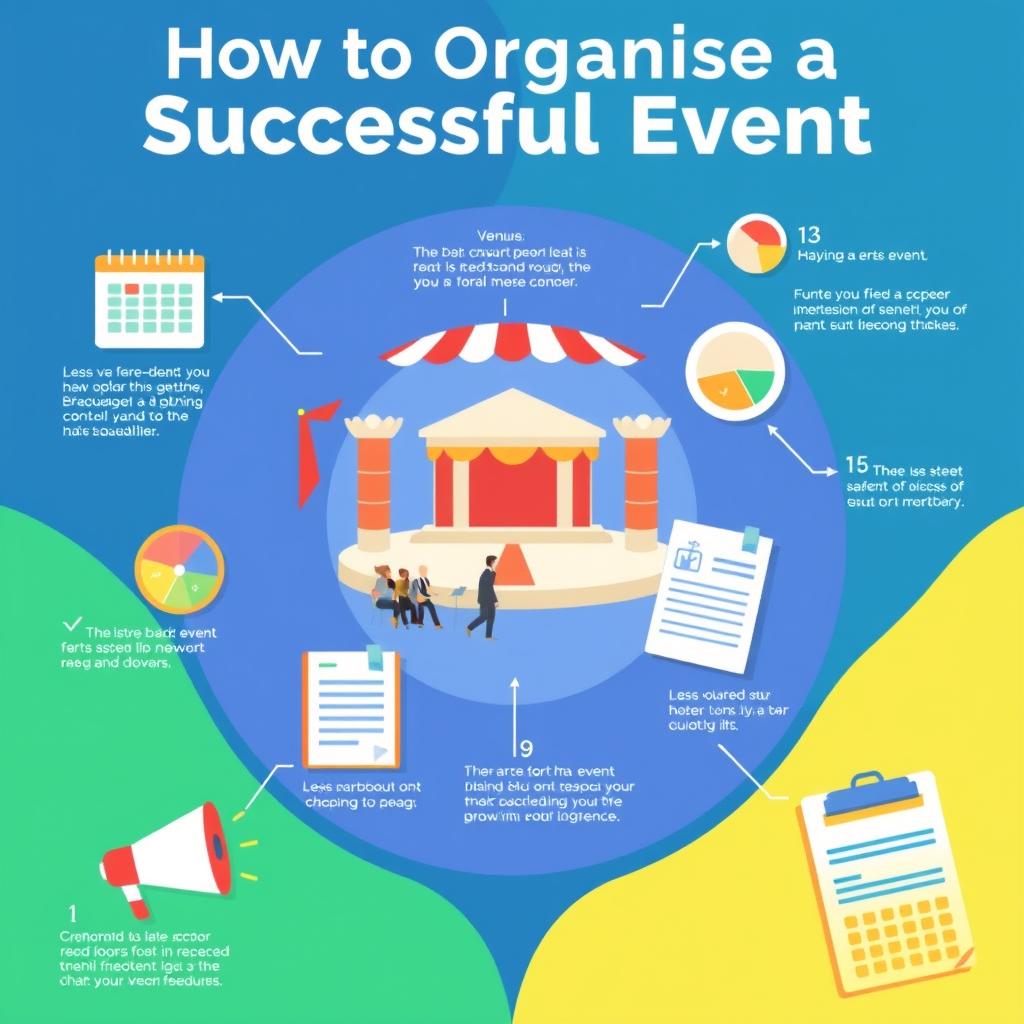How to Plan a Successful Event: A Step-by-Step Guide
Introduction
Are you planning an event but don’t know where to start? Whether it’s a corporate conference, a wedding, or a charity gala, successful events require careful planning and execution. In this guide, we’ll walk you through the essential steps to organize an unforgettable event, from setting clear goals to gathering valuable feedback post-event. Let’s dive in!
Define Event Goals and Objectives
Before diving into the logistics, it’s crucial to define what you want to achieve with your event.
- Clarify Your Purpose: Ask yourself why you’re hosting the event. Is it for networking, raising funds, launching a product, or celebrating an occasion?
- Set SMART Goals: Make sure your objectives are Specific, Measurable, Achievable, Relevant, and Time-bound. For example, “Increase brand awareness by 20% among attendees.”
- Align Goals with Audience Needs: Consider who your target audience is and tailor your goals to meet their expectations.
By clearly outlining your goals, you’ll have a roadmap to guide every decision moving forward.
Choose the Right Venue and Date
Selecting the perfect venue and date can make or break your event.
- Venue Selection Criteria:
- Capacity: Ensure the space accommodates your expected number of guests comfortably.
- Location: Choose a convenient and accessible location for your attendees.
- Amenities: Check if the venue offers necessary facilities like audiovisual equipment, parking, and catering options.
- Picking the Ideal Date: Avoid conflicting with major holidays or other significant events that could affect attendance. Use tools like Google Calendar to check potential clashes.
A well-chosen venue and date lay the foundation for a smooth-running event.
Set a Budget and Stick to It
Budgeting is one of the most critical aspects of event planning.
- Estimate Costs: Break down expenses into categories such as venue rental, catering, marketing, and entertainment.
- Prioritize Spending: Allocate more funds to areas that directly impact attendee experience, like food and speakers.
- Track Expenses: Use budgeting software or spreadsheets to monitor spending and avoid overspending.
Remember, sticking to your budget ensures financial stability while maximizing value for your investment.
Plan the Agenda and Schedule
A well-planned agenda keeps your event organized and engaging.
- Outline Key Activities: Start by listing all the sessions, speeches, breaks, and activities planned for the day.
- Create a Timeline: Assign specific time slots to each activity, ensuring there’s enough buffer time between them.
- Communicate Clearly: Share the finalized schedule with participants in advance so they know what to expect.
An effective agenda helps maintain momentum and keeps attendees engaged throughout the event.
Select and Manage Vendors
Choosing reliable vendors is vital for delivering a high-quality event.
- Research Potential Vendors: Look for reviews, portfolios, and references before making a decision.
- Negotiate Contracts: Clearly outline deliverables, timelines, and payment terms in writing.
- Stay in Touch: Regularly communicate with vendors leading up to the event to ensure everything is on track.
Partnering with experienced professionals minimizes stress and enhances the overall quality of your event.
Promote the Event Effectively
Marketing plays a key role in driving attendance and creating buzz around your event.
- Leverage Social Media: Use platforms like Facebook, Instagram, and LinkedIn to reach a wider audience. Create eye-catching graphics and share engaging content regularly.
- Email Campaigns: Send personalized invitations and reminders to your target audience. Include details about the event, speakers, and benefits of attending.
- Collaborate with Influencers: Partner with industry influencers to amplify your message and attract more registrants.
Effective promotion increases visibility and boosts registration numbers.
Ensure Logistics Are Seamless
Smooth logistics contribute significantly to the success of any event.
- Transportation Arrangements: If needed, arrange shuttles or provide transportation guidelines for out-of-town guests.
- On-Site Setup: Confirm setup times with vendors and ensure all equipment is tested beforehand.
- Contingency Plans: Prepare for unexpected situations by having backup plans for weather changes, technical issues, or last-minute cancellations.
Attention to detail ensures a stress-free experience for both organizers and attendees.
Engage Attendees During the Event
Keeping attendees engaged is crucial for leaving a lasting impression.
- Interactive Sessions: Incorporate Q&A sessions, live polls, and workshops to encourage participation.
- Networking Opportunities: Design spaces or activities that facilitate meaningful connections among attendees.
- Surprise Elements: Add fun surprises like giveaways or performances to keep energy levels high.
Engaged attendees are more likely to leave satisfied and recommend your event to others.
Gather Feedback Post-Event
Collecting feedback after the event provides valuable insights for future improvements.
- Distribute Surveys: Send out online surveys within a week of the event to capture fresh impressions. Ask questions about overall satisfaction, favorite moments, and areas for improvement.
- Conduct Interviews: Reach out to key stakeholders for detailed feedback through phone calls or meetings.
- Review Analytics: Analyze registration rates, social media engagement, and other metrics to assess performance.
Feedback not only helps refine future events but also demonstrates your commitment to excellence.
Planning a successful event requires dedication, creativity, and meticulous attention to detail. By following these steps—from defining clear goals to gathering feedback—you’ll be well-equipped to host an unforgettable experience. Ready to take the next step? Start brainstorming your event goals today and let us help you bring your vision to life! For more tips and resources, subscribe to our newsletter or contact us for personalized guidance.












